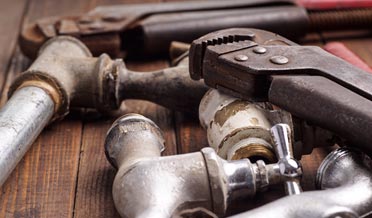Common Plumbing Repair Mistakes and How to Avoid Them
Indoor plumbing dramatically changed the American lifestyle and while it seems so commonplace today, about 50% of homes of American homes were not plumbed in 1960. Still, most homeowners don’t understand plumbing well—it tends to frustrate many would-be do-it-yourselfers.
To better understand plumbing, remember these two principles.
- Water is very powerful and can be extremely destructive. The Grand Canyon is a monumental tribute to the power of water.
- Water will always seek a path out or down.
Freshwater plumbing is a closed system under pressure, so any flaw in the system is an escape point for the water. Wastewater plumbing employs gravity to move water and its contents, so gravity will seek flaws as an escape point.
Plumbing problems happen when there is a flaw in the system. Here are the three most common flaws in residential plumbing.
Problems with Joints
Since freshwater systems are under pressure, any joint in the system has the potential for a flaw. Since these joints vary, the problems are many.
- Some joints are threaded. Flaws in these joints can happen when the joints are cross-threaded, overtightened, or sealant is improperly applied.
- Some joints are soldered. If the tubing is wet or dirty, or if the joint is improperly sealed, water will escape. These joints are threatened by movement.
- Some joints are chemically sealed—a catalyst bonds the joined pieces together. If the surface is dirty or insufficient catalyst is applied, the joint will not properly seal.
Training and experience are the best assurance for properly sealed joints.
Problems with Valves and Faucets
Freshwater is kept under pressure by valves, on the supply end, and faucets, on the delivery end. These pressure points also hold potential for flaws.
- The seals and seatings for valves/faucets vary, from rubber O-rings to plastic fittings. These seals are susceptible to wear from use and may need to be replaced.
- Mineral salts that naturally occur in the water supply deposit on the valve joints and exacerbate the wear from use.
These flaws can be very frustrating since the water leaks are slow and persistent.
Piping problems
Freshwater is transported into the house through a network of pipes and wastewater is transported out of the house through a separate network of pipes. Any flaws in the pipes should have been discovered during installation. However, flaws can develop.
- Freezing temperatures can cause the water inside the pipes to freeze, and frozen water occupies more volume than liquid water. Since the water is already under pressure, icy temps can cause the pipes to burst.
- If the water supply contains abundant mineral salts or organic material, these can deposit inside the pipes and cause blockage. A blockage will increase the water pressure, and any flaw will result in a leak.
Pipe flaws are a serious plumbing problem, that tend to be more systemic rather than localized.
Fix Any Plumbing Repair Mistakes, Once and For All
Let Doctor Cool help with your plumbing repair questions before buying your home. Call Doctor Cool & Professor Heat today at 281-338-8751 or email Doctor Cool and let our professional Residential Plumber Contractors assist with all of your plumbing repair questions.

